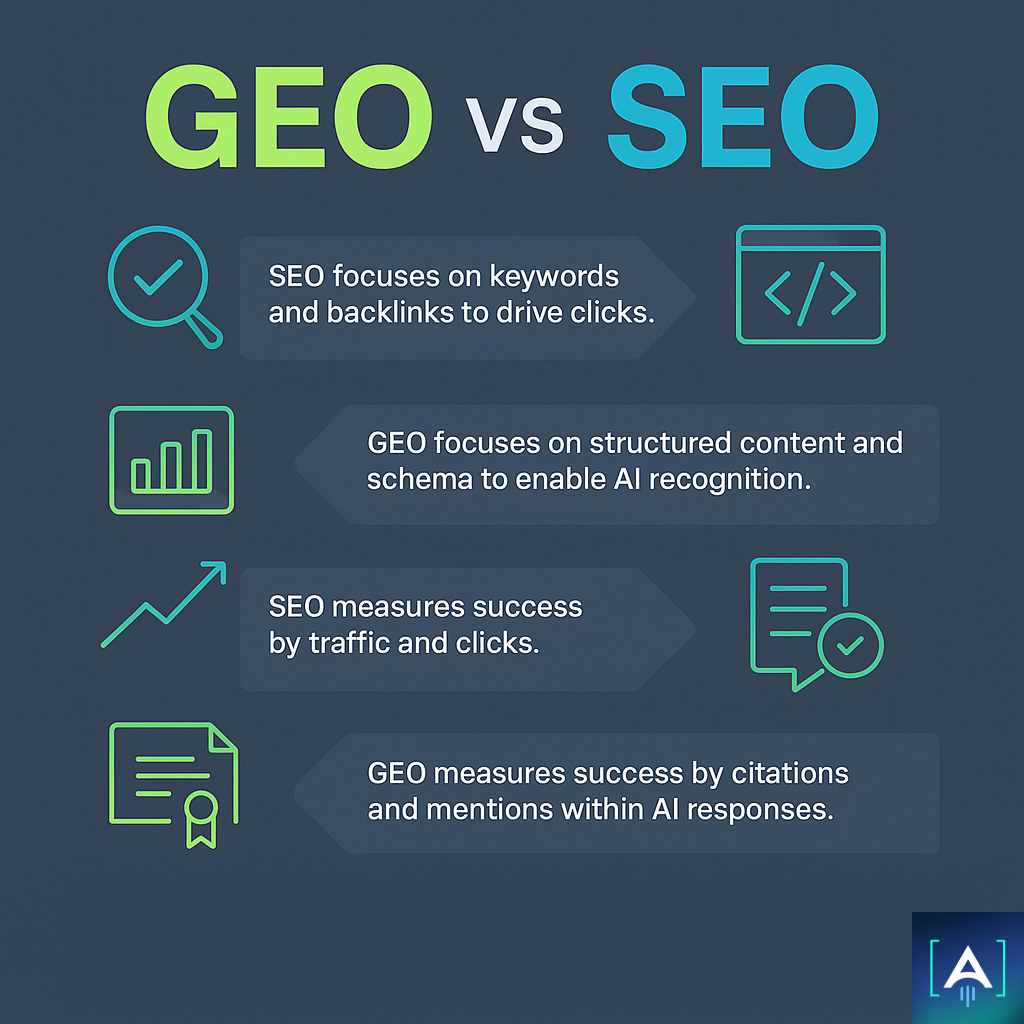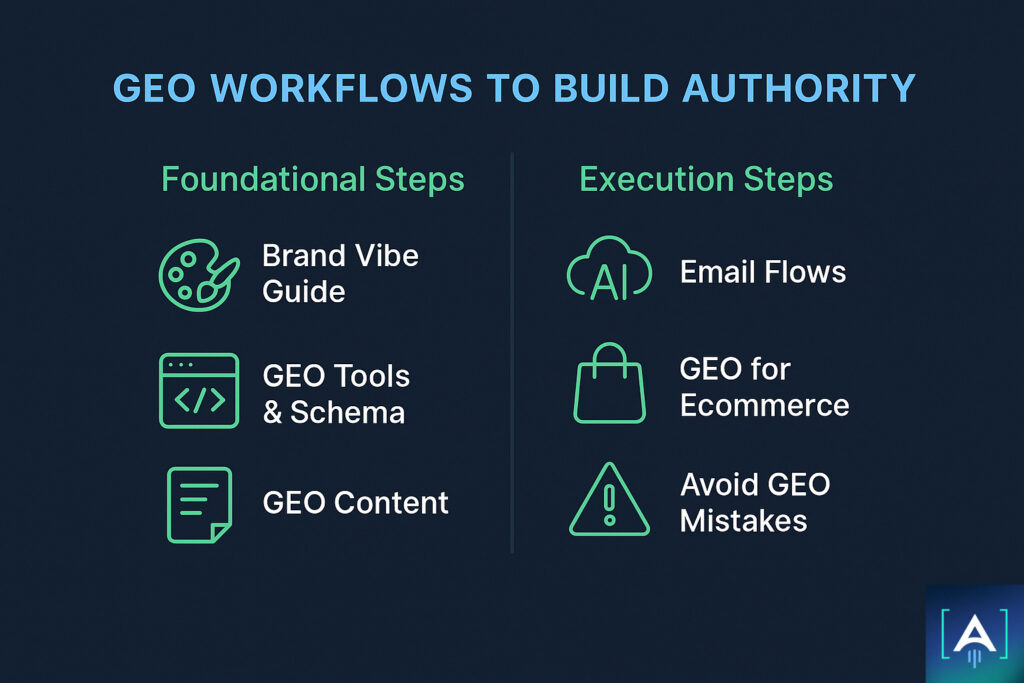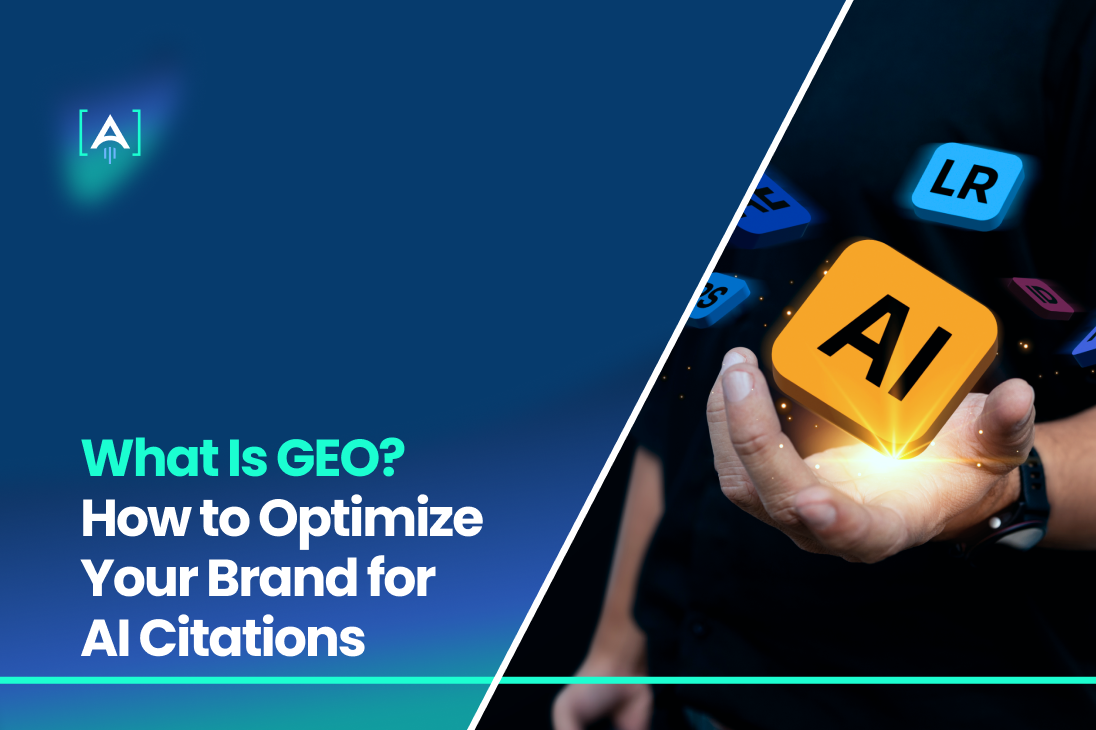Search has changed. Users ask full questions. AI systems like ChatGPT, Gemini, Perplexity, Claude, and Google’s AI Overviews respond with synthesized answers drawn from many sources. In this world, “ranking” on a page of blue links is not enough. You need to be included inside the answer. That is the promise of GEO: Generative Engine Optimization.
This guide explains what GEO is, why it matters, how AI engines actually choose sources, and how to build a practical program that earns citations and turns them into a pipeline. You will get a clear framework, a tactical checklist, recommended metrics, and a 90-day plan you can start this week.

GEO in one sentence
Generative Engine Optimization is the practice of making your content easy for AI systems to find, understand, trust, and cite in their answers.
If SEO was about earning a place on a search results page, GEO is about earning a place inside the answer.
Why GEO matters now
Three shifts make GEO unavoidable:
- Questions, not keywords. People ask conversational questions with constraints and context. “Best CRM for a 20-person team under $50 per seat that syncs with Gmail.” That single prompt contains intent, budget, features, and team size.
- Answers, not lists. AI engines synthesize a response from multiple sources. Only a handful are cited. Many sessions end without a click, so inclusion is the new visibility.
- Higher intent traffic. When users do click after an AI answer, they arrive pre-qualified. You will often see longer sessions, more pages per visit, and stronger conversion. GEO trades some volume for relevance and intent.
GEO does not replace SEO. You still need fast pages, crawlable architecture, and healthy backlinks. GEO builds on that foundation with clarity, structure, and authority signals that large models can verify and quote.
GEO vs SEO: the differences that matter
Think in pairs to keep the distinction crisp:
- Goal: SEO aims for a position in results. GEO aims for a citation inside an answer.
- Unit of value: SEO values the page. GEO values the paragraph, the list item, and the table row that can be lifted verbatim.
- Optimization focus: SEO emphasizes keywords and link equity. GEO emphasizes clarity, structure, entity precision, recency, and proof.
- Technical substrate: SEO relies on crawlers and index updates. GEO must also support real-time retrieval and synthesis, which rewards clean markup and up-to-date content.
- Measurement: SEO reports impressions and clicks. GEO reports citations, share-of-answer, prompt coverage, answer accuracy, AI-referred traffic, and branded search uplift.

How AI engines decide what to cite
Understanding the invisible workflow helps you design content that wins inclusion.
1) Intent understanding
The model breaks a natural language question into sub-questions.
“Best payroll software for US contractors under $200 with 1099 support” becomes vendor landscape, 1099 features, pricing threshold, compliance, and small team fit.
2) Source retrieval
Depending on the platform, the system consults training memory, recent crawls, and live web. It fetches pages, PDFs, videos with transcripts, forums, structured profiles, and review sites. Accessibility matters: blocked bots, heavy client-side rendering, or paywalls limit inclusion.
3) Snippet scoring
Models weigh spans of text, not just whole pages. Signals include topical fit, specificity (numbers, dates, definitions), clarity, authority, recency, and agreement across sources. One tight definition can beat an unfocused 2,000-word essay.
4) Synthesis
The engine assembles a compact answer: a short lead summary, bullets or a table, and a few citations. If evidence conflicts, it may fetch again, downrank uncertain claims, or omit them.
5) Attribution
Only a few sources make the final list. Winners typically own a fact or method, are easy to quote, present credible authorship, and appear across reputable platforms (for example, LinkedIn articles, Wikipedia where notable, industry media, review sites).
Your job is to make your content easy to retrieve, easy to trust, and easy to quote.
The GEO framework: Four pillars that compound
Use these pillars to turn strategy into repeatable execution.
Pillar 1: Authority signals
AI systems prefer experts and primary sources. Build signals that models can verify.
- Real bylines with credentials, consistent bios, and Person schema
- Original data, benchmarks, and methods with dates
- Quality backlinks and third-party mentions from credible domains
- Review presence on trusted platforms in your category
- Consistent entities for company, product names, categories, and people
Authority takes time, but it compounds. One strong annual benchmark can anchor citations for months.
Pillar 2: Content structure
Write for extraction. Make it simple for a model to lift the right sentence.
- Lead with the answer in the first one or two lines
- Use question-style H2s and precise H3s
- Keep paragraphs short and self-contained
- Prefer bullets for lists and create comparison tables with “best for” guidance
- Include a 40–60 word TLDR summary per major section
- Add an FAQ block that mirrors how users ask
Pillar 3: Technical optimization
Reduce ambiguity and friction for crawlers and models.
- Allow GPTBot, CCBot, PerplexityBot, Claude Web, and Google-Extended in robots.txt
- Use semantic HTML; avoid hiding key text behind heavy client-side rendering
- Implement JSON-LD for Article, FAQPage, HowTo, Product, Organization, Person, and LocalBusiness where relevant
- Keep pages fast and mobile friendly
- Provide accurate transcripts for videos and descriptive alt text for key images
Schema is not decoration. It is the legend that tells a machine what each block means.
Pillar 4: Strategic distribution
AI engines pull from a broad ecosystem. Be present where they look.
- LinkedIn long-form articles for B2B topics
- YouTube tutorials and demos with solid transcripts
- Wikipedia where notability is met, plus relevant category pages
- Reddit and Quora for authentic domain answers
- Industry publications and review sites (G2, Capterra, Trustpilot, etc.)
Distribution is not just promotion. It is additional evidence that reinforces your authority.
Formats that earn AI citations
Some structures map especially well to synthesized answers:
- Comparison pages
- “X vs Y” and “best for” lists with tables, pricing thresholds, pros and cons, and a clear recommendation.
- Definition and concept pages
- Precise one-sentence definition with a dated source, followed by a short example and a checklist.
- How-to and checklists
- Numbered steps, two or three lines each, plus a small table for tools or requirements.
- FAQ hubs
- Ten to twenty narrow questions with direct answers. Add FAQPage schema. Keep each answer concise and cite when useful.
- Original data and benchmarks
- Annual reports, mini surveys, or proprietary usage data with methodology and dates. Primary sources win attribution.
The tactical checklist: Make pages cite-ready
Use this as a pre-publish gate on new and updated content.
- Answer first: One sentence TLDR that addresses the question directly.
- Support succinctly: Three to five bullets with specifics, numbers, or examples.
- Add a table: If a choice is involved, provide a simple side-by-side with attributes and “best for.”
- Cite and date: Two or three credible references with years. Prefer primary data.
- Structure clearly: Question-style H2s, descriptive H3s, short paragraphs, clean lists.
- Schema in place: Article plus FAQPage, HowTo, Product, or Person as relevant.
- Entities consistent: Company, product, category, and people named consistently across site and profiles.
- Accessibility verified: Bots allowed, content visible without heavy scripting, fast load on mobile.
- Distribution planned: LinkedIn article version, YouTube transcript alignment, and a short Reddit or Quora answer where it genuinely helps.
Technical GEO: schema that actually helps
- Article for blog and resources pages (headline, author, datePublished, dateModified, mainEntityOfPage).
- FAQPage for question-answer blocks that mirror real user prompts.
- HowTo for step-by-step guides with “name,” “step,” and “tool” when appropriate.
- Product for product and pricing pages with offers and reviews.
- Organization and LocalBusiness for firmographic clarity and NAP consistency.
- Person for authors with credentials, job title, sameAs links (LinkedIn, Google Scholar, etc.).
Validate with a rich results tester and spot-check in your browser’s view-source to ensure JSON-LD renders server-side or reliably client-side.
Measurement: the GEO metrics that matter
Traditional SEO metrics do not reflect inclusion inside answers. Add these to your dashboard.
- Citation frequency: The count of times your brand or URLs are credited in AI answers. Track weekly and monthly.
- Share of answer: Your citations divided by total citations in your competitive set across a fixed prompt basket. Shows relative position.
- Prompt coverage: How many priority questions include you. Start with ten to twenty must-win prompts per product or service.
- Sentiment: Positive, neutral, or negative tone of mentions. Keep negative under ten percent and address the causes.
- Answer accuracy rate: Percent of AI answers that describe you correctly. Sample monthly and correct misinformation at the source.
- AI-referred traffic: Sessions that come from AI surfaces or occur soon after exposure. Expect smaller volume with higher engagement.
- Branded search uplift: Growth in brand queries following citation gains, measured in Search Console.
- Time to inclusion: Days from publish or update to first recorded citation. Faster times indicate healthy structure and distribution.
- Structured content coverage: Share of priority pages with correct schema and clean heading hierarchy.
Tie each metric to a specific action. For example, low prompt coverage leads to new FAQ sections or a comparison page; slow time to inclusion triggers schema fixes and better internal linking; accuracy problems lead to page updates and proactive distribution of corrections.
Tools that support a GEO program
You do not need a dozen platforms. You need a small stack that you use every week.
- Monitoring: A GEO tracker that reports citations, share-of-answer, sentiment, and prompt coverage across ChatGPT, Perplexity, Gemini, Claude, and Google AI experiences.
- Optimization and auditing: An on-page auditor that flags missing schema, heading issues, thin summaries, and extractability gaps.
- Schema creation and validation: JSON-LD generators and a rich results tester to validate Article, FAQPage, HowTo, Product, Organization, and Person.
- Dashboarding: A single sheet or BI view where you plot citation frequency, share-of-answer, prompt coverage, sentiment, AI-referred traffic, and branded search uplift.
Pick one monitor, one schema workflow, and one dashboard. Commit for ninety days before you reassess.
A 90-day GEO action plan
You can start this without a new team. Follow the cadence and ship.
Week 1: Baseline and quick fixes
- Choose a monitoring tool and add your brand plus three to five competitors.
- Define ten to twenty priority prompts per product or service.
- Check robots.txt for AI crawlers and fix any disallow lines.
- Audit your top ten pages against the checklist; score them from zero to fifteen.
Outcome: a baseline of citations and share-of-answer, a prompt basket, and a prioritized page list.
Weeks 2–4: Restructure and ship
- Add FAQPage schema to the homepage, top product or service pages, and three highest-traffic posts.
- Restructure the five weakest pages: answer first, short paragraphs, question-style headings, bullets, and a 40–60 word TLDR per section.
- Publish two comparison pages with tables and clear “best for” guidance.
- Update author bios with real credentials and Person schema.
- Perform weekly QA in AI Overviews, Perplexity, and ChatGPT browsing to see what sections get lifted.
Outcome: early inclusion signals, reduced time to inclusion, and formats that models prefer.
Months 2–3: Scale authority and distribution
- Expand optimization to twenty or more pages.
- Publish one original data asset or mini benchmark with methods and dates.
- Post two LinkedIn long-form articles and participate in ten authentic Reddit or Quora threads.
- Review metrics monthly, close prompt gaps, and correct inaccurate model claims by updating your pages and distributing the fix.
Outcome: measurable growth in citation frequency and share-of-answer, plus a stronger authority profile.
Pitfalls that block citations
- Walls of text and long prefaces: If the answer is buried in paragraph four, models will skip it.
- Vague headings: “Overview” and “Background” do not help. Use questions or precise labels.
- Claims without sources or dates: Undated assertions are less citeable. Add years and links to credible sources.
- Heavy client-side rendering: If key text does not render cleanly, crawlers and models may not see it.
- Anonymous authors: Content written by “Team” or “Admin” weakens credibility. Use named experts with Person schema.
- Single-channel publishing: If all content lives only on your blog, you limit discovery. Cross-publish thoughtfully where models and audiences already look.
Conclusion: Why Azarian Growth Agency
GEO is not theory for us; it’s our operating system. We help brands earn a place inside AI answers by combining three things most teams rarely align at once: airtight structure that models can extract, credible proof that engines trust, and distribution in the ecosystems AI already pulls from.
Here’s what that means for you: in the first 90 days we baseline your “share of answer,” fix the highest-leverage pages with answer-first structure and schema, publish the comparison and definition assets models love, and ship one original data piece that earns primary-source citations.
From there, we scale: more optimized pages, smarter distribution, monthly accuracy reviews, and a dashboard that ties every metric to a next action.
The outcome isn’t just traffic; it’s inclusion. More citations, higher share of answer, and visitors who arrive pre-qualified because they met your brand in the AI conversation first.
If you have the SEO foundation, we’ll add the GEO layer that gets you named, quoted, and trusted. Ready to be the source AI chooses? Let’s make your brand the answer.

